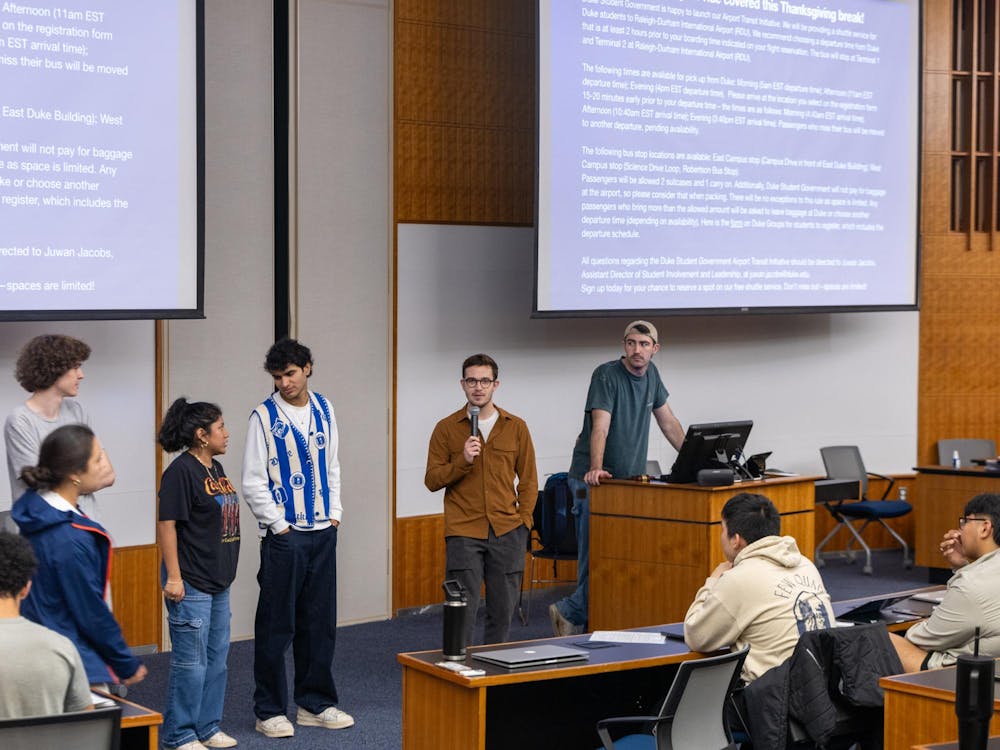Duke Student Government heard three special presentations and considered a proposed House Rules amendment on conflicts of interest during its Wednesday meeting.
DSG was five senators short of a quorum, rendering the senate unable to pass Student Organization Funding Committee legislation. Speaker of the Senate Dylan Cawley, a junior, said that he would attempt to collect votes via a Google Form, with a goal of reaching a quorum “by Friday.”
Disability at Duke
First-year Dishita Agarwal, a senator on the equity and outreach committee, delivered a special presentation on challenges faced by Duke students with disabilities.
Agarwal began her remarks by sharing that in 2000, Duke settled a lawsuit with a former student who used a wheelchair, who claimed that several University facilities “were not accessible to people with mobility impairments.”
Under an agreement with the Department of Justice, Duke agreed to make a “broad range of programs more accessible to persons with disabilities,” such as modifying campus facilities, ensuring buses run on schedule and paying $7,500 compensatory damages to the plaintiff. It marked the first agreement the DOJ had reached “regarding widespread accessibility of a college or university.”
However, Agarwal identified a number of accessibility problems that persist on campus today.
“A lot of systems exist for accessibility, but they don’t really work properly,” she said.
Agarwal explained that disability services at Duke are managed by the Student Disability Access Office, with involvement from other departments including Housing and Residence Life and Parking and Transportation. She claimed that SDAO acts largely “as a mediator” between students and those departments.
According to Agarwal, Duke students with disabilities are required to request Americans with Disabilities Act-compliant transportation “three to four days ahead,” which she said can be difficult for students with dynamic schedules. She also advocated for more widespread CPR and AED training among students and staff.
Agarwal characterized the first-year meal plan, which is designed for students to have two meals each day at Marketplace, as “imposing a rigid schedule” on students with disabilities.
“There’s not enough transportation to get back and forth [between campuses], and [it’s] very strenuous sometimes to come back to East Campus for all meals,” she said. “Only giving half or less [in food point] equivalency feels a bit punitive for people who physically can’t go to those meals.”
Lastly, Agarwal pointed to challenges faced by students with disabilities in participating in social life at Duke, such as sporting events or off-campus extracurriculars.
To Agarwal, DSG’s role in accessibility advocacy is to “make noise” — generate discussion on campus and elevate accessibility demands to the “highest leadership.”
“Anyone anywhere can become disabled at any moment,” she said. “… Being disabled is a very hard experience.”
Other presentations
Keanu Valibia, president of Duke Graduate and Professional Student Government and third-year master’s student in the Nicholas School of the Environment, addressed DSG for the first time.
Valibia explained the structure of GPSG committees and highlighted key projects, such as the Community Pantry and upcoming plans for a low-waste graduate student campout in Krzyzewskiville. Following his remarks, Valibia answered questions from senators.
Representatives from student organization Progress Period shared a presentation about their new Period Product in Dorms initiative that aims to stock menstrual products in dorm bathrooms in an effort to “close the menstrual equity gap for on-campus residents.” Products will be stored in clear bins in residence hall bathrooms and restocked monthly.
According to the presentation, an “official housing survey” with 250 respondents found that 57% of respondents found themselves without access to menstrual products when they needed them, and 80% were “very interested” in having free products available in residential bathrooms.
Get The Chronicle straight to your inbox
Sign up for our weekly newsletter. Cancel at any time.
The representatives from Progress Period shared that they are seeking funding from individual quad councils for participation in the program. They explained that while some community members were under the impression that DSG could fund the program, this was not the case.
Progress Period aims to fully roll out the program by the end of December.
Proposed amendment on conflicts of interest
Sophomore Samanyu Gangappa, a senator in the campus life committee, gave a first reading of a proposed amendment to the house rules requiring “senators to abstain from certain votes when the senate is handling finances the senate enjoys oversight over.”
Gangappa emphasized that according to the amendment proposal, senators are encouraged to self-enforce their abstention when conflicts of interest arise. However, if the speaker of the senate — currently Cawley — deems an affirmative-voting senator as having a conflict of interest, the speaker would alter the vote to an abstention.
The senate voted to commit the amendment proposal to a committee consisting of Cawley, Gangappa and sophomore senator Yash Sharma.
Committee updates
Senior Jax Nalley, DSG chief of staff, promoted the Airport Transportation Initiative, which provides a shuttle service to take Duke students to Raleigh-Durham International Airport during select departure times.
Junior Mariam Gulamhusein, vice president of the services and sustainability committee, shared that the Food Recovery Network, a nonprofit that aims to fight climate change and food insecurity on college campuses, met with GPSG for an upcoming collaboration.
Sophomore Rachel Talcoff, associate vice president of the academic affairs committee, announced that the committee is tabling Thursday from 10 a.m. to 1 p.m. on the Bryan Center Plaza to collect books for a hurricane relief book drive.
Editor’s note: Sophomore senator Samanyu Gangappa, who presented the proposed amendment on conflicts of interest, is the Local/National News Editor of The Chronicle’s 120th volume.

Michael Austin is a Trinity junior and managing editor of The Chronicle's 120th volume.

